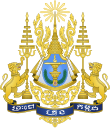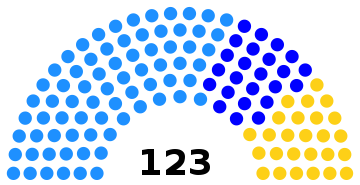The politics of Cambodia are defined within the framework of a constitutional monarchy, in which the king serves as the head of state, and the prime minister is the head of government. The collapse of communism set in motion events that led to the withdrawal of the Vietnamese armed forces, which had established their presence in the country since the fall of the Khmer Rouge. The 1993 constitution, which is currently in force, was promulgated as a result of the 1991 Paris Peace Agreements, followed by elections organized under the aegis of the United Nations Transitional Authority in Cambodia. The constitution declares Cambodia to be an "independent, sovereign, peaceful, permanently neutral and non-aligned country." The constitution also proclaims a liberal, multiparty democracy in which powers are devolved to the executive, the judiciary and the legislature. However, there is no effective opposition to the Prime Minister Hun Sen, who has been in power from 1984 up to 2023. His Cambodian People's Party won all 125 seats in the National Assembly in 2018 after the banning of opposition party CNRP and KNLF. KNLF became a main opposition exiled in Denmark after CNRP was dissolved. During the communal election in 2022 and the national election in 2023, there were no international observers. The government is considered to be autocratic.

Norodom Sihanouk was a Cambodian statesman, Sangkum and FUNCINPEC politician, film director, and composer who led Cambodia in various capacities throughout his long career, most often as both King and Prime Minister of Cambodia. In Cambodia, he is known as Samdech Euv. During his lifetime, Cambodia was under various regimes, from French colonial rule, a Japanese puppet state (1945), an independent kingdom (1953–1970), a military republic (1970–1975), the Khmer Rouge regime (1975–1979), a Vietnamese-backed communist regime (1979–1989), a transitional communist regime (1989–1993) to eventually another kingdom.

After the fall of the Pol Pot regime of Democratic Kampuchea, Cambodia was under Vietnamese occupation and a pro-Hanoi government, the People's Republic of Kampuchea, was established. A civil war raged during the 1980s opposing the government's Kampuchean People's Revolutionary Armed Forces against the Coalition Government of Democratic Kampuchea, a government in exile composed of three Cambodian political factions: Prince Norodom Sihanouk's FUNCINPEC party, the Party of Democratic Kampuchea and the Khmer People's National Liberation Front (KPNLF).

Samdech Hun Sen is a Cambodian politician and former military general who served as the prime minister of Cambodia from 1985 to 2023. Hun Sen is the longest-serving head of government in Cambodia's history. He is the president of the Cambodian People's Party (CPP), which has governed Cambodia since 1979, and a member of the National Assembly for Kandal. His full honorary title is Samdech Akka Moha Sena Padei Techo Hun Sen.

The National United Front for an Independent, Neutral, Peaceful and Cooperative Cambodia, commonly referred to as FUNCINPEC, is a royalist political party in Cambodia. Founded in 1981 by Norodom Sihanouk, it began as a resistance movement against the People's Republic of Kampuchea (PRK) government. In 1982, it formed a resistance pact with the Coalition Government of Democratic Kampuchea (CGDK), together with the Khmer People's National Liberation Front (KPNLF) and the Khmer Rouge. It became a political party in 1992.
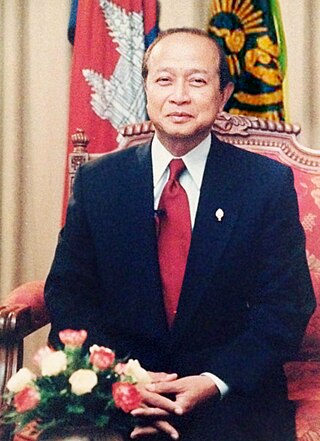
Norodom Ranariddh was a Cambodian prince, politician and law academic. He was the second son of King Norodom Sihanouk of Cambodia and a half-brother of King Norodom Sihamoni. Ranariddh was the president of FUNCINPEC, a Cambodian royalist party. He was also the first Prime Minister of Cambodia following the restoration of the monarchy, serving between 1993 and 1997, and subsequently as the President of the National Assembly between 1998 and 2006.
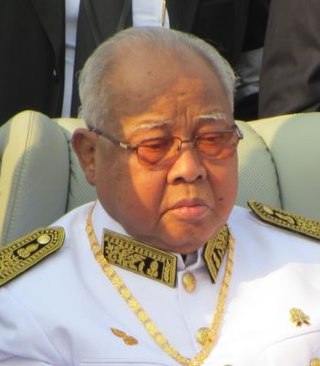
Chea Sim was a Cambodian politician. He was President of the Cambodian People's Party from 1991 to 2015, President of the National Assembly of Cambodia from 1981 to 1998 and President of the Senate from 1999 to 2015. His official title was Samdech Akka Moha Thomma Pothisal Chea Sim.

Norodom Chakrapong is a Cambodian politician, businessman and former major-general of the Royal Cambodian Armed Forces. He is the fourth son of Norodom Sihanouk of Cambodia and also a half-brother of the current king, Norodom Sihamoni. Chakrapong started his career as a military pilot in 1963. After Sihanouk was overthrown in 1970, Chakrapong spent time under house arrest, then in Beijing as the Head of Protocol of then-Prince Sihanouk, afterwards living overseas before he joined the Funcinpec in 1981 and fought against Vietnamese occupation as a commander of the Armée Nationale Sihanoukiste. In 1991, Chakrapong left Funcinpec to join the Cambodian People's Party (CPP) and served as the Deputy Prime Minister of Cambodia between 1992 and 1993. When the CPP lost the 1993 general elections, Chakrapong led a secession attempt in 1993. In 1994, he was accused of joining a failed coup attempt which led him to be sent into exile. After Chakrapong was pardoned in 1998, he founded a private airline company, Royal Phnom Penh Airways. The airlines later stopped all operations in early 2006.
Ung Huot is a Cambodian former politician who served as Prime Minister of Cambodia from 1997 to 1998, alongside Hun Sen. A member of the FUNCINPEC Party, he served as Minister of Education, and Minister of Foreign Affairs prior to his appointment as First Prime Minister.

Sam Rainsy is a Cambodian activist, economist and politician who most recently served as the Leader of the Opposition. He is now the interim leader of the Cambodia National Rescue Party due to the continued ban on political activity by the party's leader, Kem Sokha.

Sar Kheng is a Cambodian politician. He is the vice president of the ruling Cambodian People's Party and served as Minister of the Interior and deputy prime minister from 1992 to 2023. He also represents the province of Battambang in the Cambodian Parliament. Kheng has been the Minister of the Interior since 1992. Until March 2006, he shared the position with FUNCINPEC party member You Hockry as co-Ministers of the Interior, but then became sole interior minister in a cabinet reshuffle as FUNCINPEC ended its coalition with the CPP.

General elections were held in Cambodia on 27 July 2008. The result was a victory for the ruling Cambodian People's Party, which won 90 of the 123 seats.

The 1997 Cambodian coup d'état took place in Cambodia from July to September 1997. As a result, co-premier Hun Sen ousted the other co-premier Norodom Ranariddh. At least 32 people were killed during the coup.
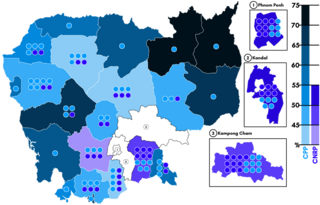
General elections were held in Cambodia on 28 July 2013. The National Election Committee (NEC) announced that some 9.67 million Cambodians were eligible to cast their ballots to elect the 123-seat National Assembly. Voter turnout was reported to be 69.6%, a record low for a general election. Polling precincts opened 7:00 a.m. and closed at 3:00 p.m. The Cambodian Minister of Information, Khieu Kanharith announced in preliminary results that the Cambodian People's Party won 68 seats and the opposition Cambodia National Rescue Party won all the remaining 55 seats. This election marked the largest seat loss by the Cambodian People's Party to date, and their lowest share of seats since 1998.

The Community of Royalist People's Party was a Cambodian political party that lasted from March 2014 until January 2015. It was founded and led by Norodom Ranariddh, who had been ousted from FUNCINPEC back in 2006. Ideologically a royalist party, the CRPP drew its inspiration from the political legacy of the former King of Cambodia, Norodom Sihanouk, and competed for its voter base with both FUNCINPEC and the Cambodia National Rescue Party (CNRP). In January 2015, the CRPP was dissolved when Ranariddh returned to FUNCINPEC.

General elections were held in Cambodia on Sunday, 29 July 2018 to elect members of the sixth National Assembly. Polling stations opened at 07:00 and closed at 15:00. The number of registered voters has decreased for the first time since 1993 and was down 13% from the 2013 general elections.
Senate elections were held in Cambodia on 25 February 2018 after being postponed from 14 January 2018. For the first time, the Senate and parliamentary elections occurred in the same year. The result was a victory for the CPP, which won all 58 seats. King Norodom Sihamoni nominated Princess Norodom Arunrasmy and Oum Somanin to the Senate.

Communal elections were held in Cambodia on 5 June 2022. It was the fifth quinquennial communal election in Cambodia since 2002. 1,652 communes in all 25 provinces of Cambodia were contested for a total of 11,622 commune council seats. The election precedes the 2023 general election and the 2024 Senate election. 9.2 million of 10.5 million eligible voters were registered to cast their ballots. Voter turnout was 80.3%.

General elections were held in Cambodia on 23 July 2023 to elect members of the National Assembly. The Cambodian People's Party (CPP) held all seats in parliament prior to the elections.
Ke Kim Yan is the former Commander-in-Chief of the Royal Armed Forces of Cambodia and currently one of the ten Deputy Prime Ministers of Cambodia. He is considered as a "highly professional officer with a realistic approach to the challenges before him".
